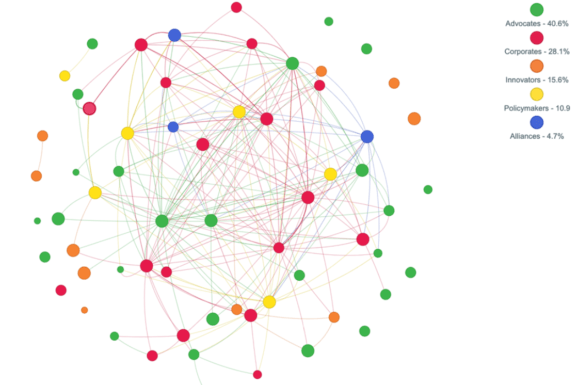Maps have always reflected the way we have understood the world around us and the uncharted frontiers we have yet to cross. With this post, Handshake inaugurates its “Map of the Month” series, where we look at the networks of individuals and organizations that are central to a given issue and constitute its social community. Each map helps us deconstruct an issue into its actors and distill the ideas it shares so that we can better understand current challenges, as well as opportunities for change.
Handshake has developed a proprietary business intelligence platform, Navigator, which maps the social networks of organizations and individuals who drive issues that are important to our society. An important benefit to understanding how networks form and operate is the ability to create a “strategic direction” that outlines how actors in the network can be brought together to achieve impactful outcomes that benefit society.
Issue Focus – The Global Plastics Network
This month Handshake explored the global network around plastics, with a specific focus on production, consumption, and recycling.
If we are to solve global challenges facing our society such as reducing the consumption of plastics and addressing plastics pollution, then collaboration and coordination across actors in the network at a larger scale will be needed. By re-evaluating the issue of plastics as a network of stakeholders we cast a vision for how this community of committed actors can harness their influence – ideas, passion, resources, and capital – to scale impact.
The global plastics network is made up of a series of conversations involving specific topics, including pollution, recycling, and efforts to ban plastics.

Network Overview
We have broken down the actors within the plastics network into five categories:
- Advocates – These are mostly NGOs who are hoping to address plastic pollution through any number of actions – such as awareness campaigns, policy development, and advocacy. This set of actors represents roughly 40 percent of the network – the largest group of actors in the network.
- Corporates – Comprising 28 percent of the network, corporates are private sector actors who have made public commitments around reducing the use of plastics, developing new recycling programs, or partnering with other stakeholders and policymakers to address plastic pollution.
- Innovators – These are individuals, companies, or organizations that are focused on bringing new solutions to the network to help solve challenges around plastic pollution. Examples include Skipping Rocks Lab, a London-based startup that is using various types of plants to create waste-free alternatives to plastic bottles, and The Ocean Cleanup, a company using a combination of algorithms and ocean “floaters” to pick up plastic waste in the Pacific Ocean. Innovators make up just over 15 percent of the network.
- Policymakers – These include regulators, legislators or global policy institutions (such as the United Nations) who have a mandate to develop policy frameworks to reduce the use of plastics, increase recycling, and cut down on pollution. Policymakers comprise just under 11 percent of the actors in the network.
- Alliances – These are partnerships of actors working together to address plastics-related issues. This is the smallest set of actors, making up less than 5 percent of the global plastics network.
Network Insights
There are three insights Handshake has gleaned from analyzing this network:
- Many of the sector actors engage more amongst themselves than they collaborate with other actors across all sectors.
- This leads to a narrow way of thinking and a lack of coordination. The overall lack of alliances is another indication that the network actors are not engaging in a coordinated manner and instead tend to take a siloed approach in addressing this issue.
- Those organizations and individuals that have made a commitment to action or innovation are on the periphery of the network.
- This reinforces a lack of ability or desire on the part of corporates and policymakers to collaborate with a diverse group of partners in a way that scales their efforts or augments their ideas.
- Looking closer, the greater interconnectivity within the private sector indicates that most corporates focus on private sector partnerships and positioning rather than partnering with a variety of actors to bring greater innovation and problem-solving.
- This reveals a serious lack of alignment between the focus of regulators and innovators – which poses an obstacle for establishing successful broad-based alliances on this issue.
Taken together, these insights show a network that is not organized in a way to bring cohesive, impactful solutions that address problems such as plastic over-production and pollution pose to society. In order for a network to drive the change needed to solve these problems, there needs to be active and ongoing cross-sector collaboration, an efficient means of incorporating innovative ideas, and a strong set of actors able to drive collective change.
That is not to say progress is not being made across efforts to address and tackle plastic pollution. Without a doubt, individuals are tirelessly working to clean up local parks and waterways, communities are maintaining recycling programs despite the challenges they face in those efforts, companies are adapting their business models to limit the use of plastics, and global organizations such as the UN are creating broad-based policy frameworks to facilitate action.
However, our research shows that these efforts are too scattered and uncoordinated to bring a meaningful positive change in the coming years. What is needed most are institutions that emerge and establish themselves as trusted and credible actors who are harnessing their resources and channeling their ideas into a coordinated effort to solve plastic pollution on a global scale.

